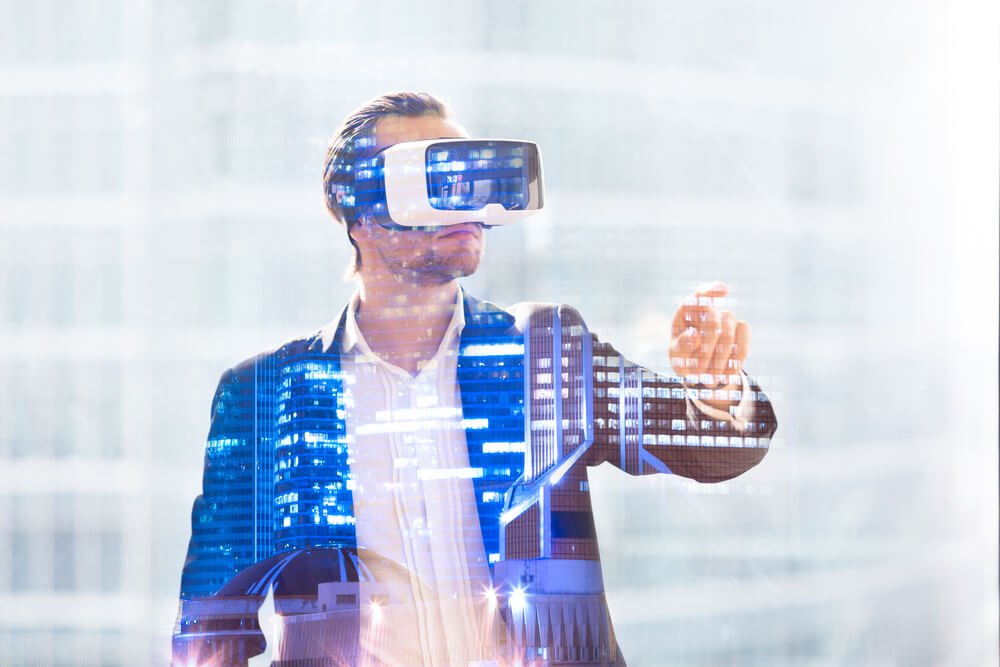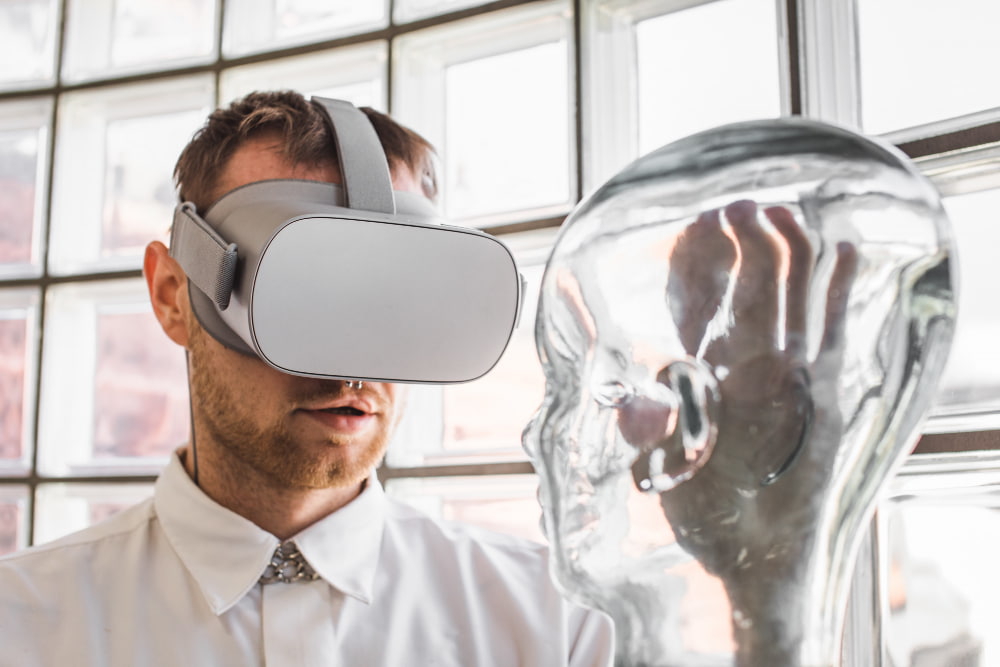Leadership Skills Development: How Virtual Reality Training Enhances Leadership
Table of Contents:
Developing Leaders in Organizations Requires Leadership Training
The financial resources allocated to this component of organizational development demonstrate its strategic importance in building sustainable competitive advantage. The effectiveness of such programs is greatest when they are based on practical experience and face-to-face interaction. However, in the evolving digital era, traditional methods are being complemented by innovative solutions such as virtual reality (VR). Leadership skills training must also take the specificities of the organization into account in order to be effective. The question arises: Is virtual reality (VR) technology going to revolutionize leadership training? In this article, we examine recent scientific research and practical applications of virtual reality for leadership skills development, as well as current trends shaping this fast-growing field.
Is It Possible to Teach Leadership Using VR?
The use of virtual reality to develop business leadership skills remains a relatively new but rapidly expanding area of exploration. Leading scientists and industry experts emphasize the importance of learning through practical experience, which explains why immersive technologies that integrate experience, perception, and action are gaining momentum. The development and understanding of leadership skills can be substantially enhanced through VR simulations that recreate complex interpersonal and organizational scenarios.
VR training facilitates the development of key leadership competencies by reflecting realistic business environments, including negotiation, conflict resolution, and strategic decision-making. Crucially, VR offers a safe space to experiment and fail without real-world consequences, accelerating learning curves. Moreover, VR-based programs can help develop empathy through virtual interactions—a vital skill in global business environments. By enabling users to immerse themselves in diverse cultural contexts, VR training supports a deeper understanding of perspectives different from one’s own, enhancing cross-cultural communication and inclusivity. Being able to understand another person’s perspective is essential to developing empathy, and leaders who adopt this skill tend to achieve better results and foster stronger team engagement.
Advantages of VR Compared to Traditional Leadership Training
In comparison with conventional teaching methods, the main advantages of VR training include:
- Higher retention rates: Participants learn from virtual reality environments in a purely experiential way, enabling them to retain up to 67% of information, according to recent studies, which surpasses traditional classroom retention.
- Customization and flexibility: VR training environments can be tailored to specific organizational needs, scenarios, and cultures, allowing for a bespoke learning experience.
- No geographical or time constraints: Unlike traditional workshops that require physical presence, VR-based training can be accessed anywhere and anytime, making leadership development continuous and scalable.
- Real-time feedback and analytics: Advanced VR platforms track behavioral data, enabling personalized coaching and progress monitoring.
These benefits position VR as a highly efficient tool for developing strategic leadership skills in an increasingly dynamic and complex business landscape.
Intercultural Dialogue: An Example of VR Simulation in Leadership Training
A notable VR training program focused on developing empathy and leadership skills in global business was described in The ISM Journal of International Business. The VR simulation immerses participants in a global business meeting in Asia, designed to deepen cultural understanding and leadership effectiveness. The training unfolds in two parts: observational and interactive.
During the observational phase, participants dynamically engage with virtual managers from diverse cultural backgrounds, gaining insights into cross-cultural communication nuances. In the interactive phase, learners assume the role of one of the managers, accessing the character’s internal thoughts, cultural assumptions, prejudices, and emotions. This design helps expose implicit biases and enhances self-awareness.
The simulation was meticulously developed using 360-degree filming and actor-driven roleplay to ensure authenticity and cultural accuracy. By fostering empathy and cross-cultural understanding, this VR experience prepares leaders for the challenges of global collaboration.
Business Leadership Training with Virtual Reality: Practical Applications
Such VR training programs prepare managers for the realities of global operations, helping them cooperate effectively with international partners. For example, by observing global business interactions from a “fly on the wall” perspective, participants identify common sources of misunderstandings rooted in cultural differences. Interactive exercises simulate critical leadership tasks such as motivation, negotiation, conflict resolution, and strategic decision-making within a global context.
This experiential learning loop enables leaders to internalize complex concepts and adapt their leadership style dynamically.
Scientific Research and Ongoing Studies on VR Leadership Training
Research teams, including Mingce Bi, Danyi Liao, Danielle Myung, Yuqi Sheng, and Fei Wu, have conducted studies evaluating the efficacy of VR leadership training. Their study involved 40 managers divided into two groups: one undergoing traditional training, the other experiencing VR-based modules. Leadership competencies were assessed before and after the interventions, with a key focus on long-term skill retention and performance improvements.
Preliminary observations suggest VR training offers significant advantages in developing leadership and management skills compared to conventional approaches. The research outcomes, expected soon, will provide valuable evidence for organizations considering VR adoption. This aligns with broader academic consensus and participant testimonials that personalized VR training is often more effective than traditional methods for enhancing strategic leadership abilities.
Emerging Challenges and Considerations for VR in Leadership Training
Despite its potential, VR leadership training faces practical challenges:
- Technology adoption and cost: Initial investment in VR hardware and software may be a barrier for some organizations, necessitating a phased rollout and clear ROI demonstration.
- Content development complexity: Creating realistic, culturally nuanced scenarios requires significant expertise and resources.
- User experience issues: Motion sickness and accessibility concerns must be addressed to ensure inclusivity.
- Data privacy: Handling sensitive behavioral data demands stringent compliance with regulations.
Addressing these challenges through strategic planning and collaboration with experienced VR developers is crucial to maximize the impact of VR-based leadership development.
Looking Ahead: The Future of VR in Leadership Development
As of 2025, the integration of AI-driven adaptive learning, biometric feedback, and mixed reality is enhancing VR leadership platforms, making training even more personalized and effective. Social VR environments are beginning to facilitate peer networking and mentorship, extending learning beyond formal sessions.
Organizations that embrace these innovations will be better positioned to develop agile leaders capable of thriving in a complex, multicultural global business landscape.
Conclusion
In summary, virtual reality is no longer a futuristic concept but an actionable, evidence-backed tool reshaping leadership training. By combining immersive experience with data-driven insights, VR enables organizations to build empathetic, culturally aware, and strategic leaders fit for the challenges of today and tomorrow.

Author: Rafał Siejca
Rafal has over twenty years of corporate experience, including roles at Millennium Bank, Comarch, and leading software teams at PZU, one of Europe’s largest insurance companies. As one of Poland’s few true VR experts with a decade of experience, he ensures timely, high-quality project delivery as CEO and CTO.










